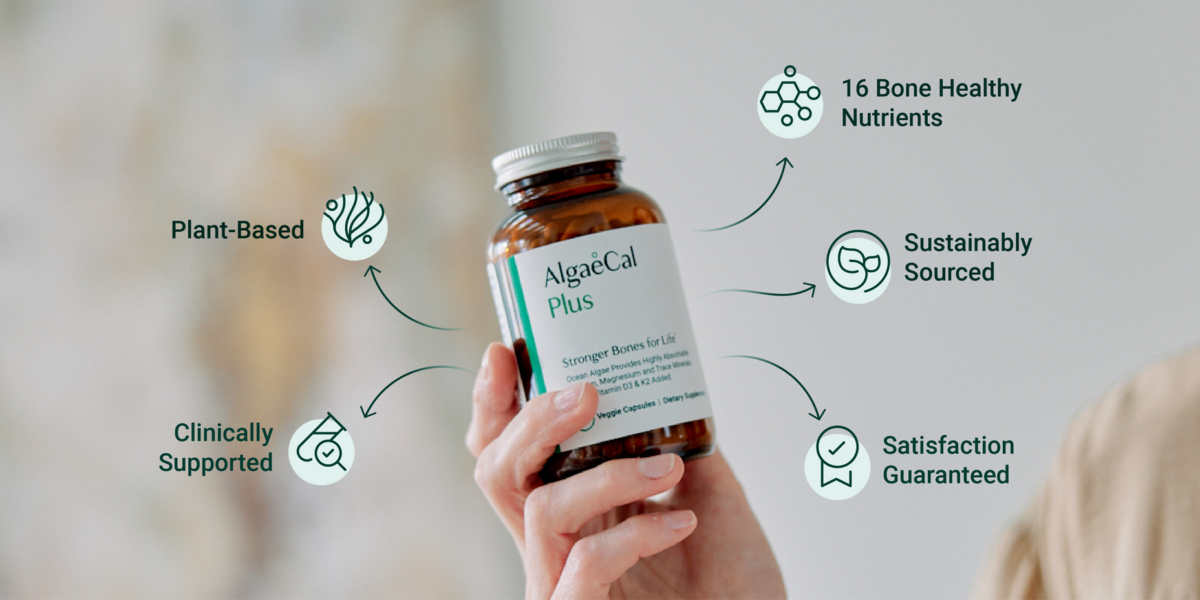How Much Calcium Do You Need in a Day? | Daily Calcium Requirement by Age | Benefits of Calcium for Bone Health | Risks of Getting Too Little Calcium | How Much Calcium Is Too Much Calcium? | Takeaways
It’s easy to see why people think you can get enough calcium by drinking milk every day. Remember those ‘milk does a body good’ commercials from way back when? For two decades they told us that milk is what makes bones strong. After all, it’s loaded with calcium.
And, as you know, our bones need calcium to stay strong and healthy. So okay, we get it — we need calcium. But how much?
I’m Lara Pizzorno, author of Healthy Bones Healthy You, and a member of the American Medical Writers Association with 30 years of experience specializing in bone health. And today I’m talking about all things calcium. How much do you need? And are Americans getting enough? Are you getting enough to have healthy bones?
How Much Calcium Do You Need in a Day?
According to the National Health and Nutrition Examination Survey, (NHANES),1 most Americans are not doing a good job of getting enough calcium.

The two groups at risk of not getting adequate amounts of calcium from their diets are children aged 9–18 and then adults aged 51 and older.
In the group of children aged 9–18, this is especially important because they’re supposed to be accruing 40% of the bone mass they need to carry them through their lives.
And if they don’t get enough calcium during these important bone-formative years, they’ll be at much higher risk of osteoporosis later. This group of individuals are supposed to get 1,300 mg of calcium a day. But typically their diet supplies a maximum of about 935 mg a day — a serious shortfall.In the group of adults aged 51 and older, the daily calcium requirement is 1,000–1,200 mg. But many in this group are only getting 674 mg of calcium per day from their diet.
Daily Calcium Requirement By Age
Of course, there are several age groups that don’t fall into the 9–18 or 51 and older categories. For a full breakdown of calcium requirements for all age groups, check out the Recommended Dietary Allowances for Calcium2
| Age | Male | Female |
|---|---|---|
| 0-6 months* | 200 mg | 200 mg |
| 7-12 months* | 260 mg | 260 mg |
| 1-3 years | 700 mg | 700 mg |
| 4-8 years | 1,000 mg | 1,000 mg |
| 9-13 years | 1,300 mg | 1,300 mg |
| 14-18 years | 1,300 mg | 1,300 mg |
| 19-50 years | 1,000 mg | 1,000 mg |
| 51-70 years | 1,200 mg | 1,200 mg |
| >70+ years | 1,200 mg | 1,200 mg |
Pregnant and Lactating women between the ages of 19-50 years require 1,000 mg of Calcium and those between the ages of 14-18 require 1,300 mg.
Benefits Of Calcium For Bone Health
As you can see, your body’s need for calcium doesn’t lessen with age. That’s why it’s important to supply your bones with the calcium they need.
After all, more than 99% of your total body calcium is stored in your bones and teeth,3 where it supports their structure and is ready to be called into action for many other critical functions.
A few of these functions include muscle contraction, the secretion of enzymes and hormones, and sending messages through the nervous system. The amount of calcium in your body fluid and tissues is closely regulated so that these vital body processes function efficiently.
Calcium also brings these benefits to the table:
- balances blood pressure
- reduces colorectal cancer
- eases PMS symptoms
- combats kidney disease
- promotes weight loss
- promotes dental health
So it’s particularly important to consume enough calcium (and its helper minerals and vitamins such as magnesium, vitamins D3, K2, C, boron, and trace minerals).

Risks Of Getting Too Little Calcium
When you don’t get enough calcium or don’t absorb enough, bone breakdown occurs because the body removes the calcium stored in bones to keep more urgent functions going — such as generating a heartbeat.
This is especially problematic for older adults since we begin to resorb more bone much more rapidly as we get older. This is due to the decline in hormones: estrogen in women and testosterone in men.
The estrogen drop-off happens sooner in women. But men also experience a dip in the amount of testosterone they produce. In men, a small amount of testosterone is converted to estrogen.
And that estrogen is critical for men’s bones. So both genders need to ensure they’re getting enough calcium to make up for the deficits that come with advancing age.
A number of studies have been done that show that calcium supplementation can help make up for this shortfall.
“A very famous calcium researcher named Robert Heaney published a study4 in The Journal of The American College of Nutrition in 2001 that showed that women who did not take calcium supplements lost bone at a rate of 1% per year. But women who did take calcium supplements only lost bone at a rate of 0.014% per year. So that’s about a 100% lower rate of bone loss. Calcium supplementation can really help make up the deficits that we experience with age.”
How Much Calcium Is Too Much Calcium?
It’s clear that not getting enough calcium is bad for your bones. But what happens if you get too much calcium? If you’ve ever wondered this, you’re not alone. One of AlgaeCal’s Facebook Community members, Cindy, said:
“I have a question about how much calcium is too much. My doctor told me to be careful because too much calcium can cause kidney stones. Is this true with the type of calcium in AlgaeCal?”
Welcome, Cindy! You’re in the right place! And that’s a great question.
While you don’t want to exceed the recommended daily allowance for calcium, you also need to pay attention to the form of calcium you take.
AlgaeCal is easier for the body to absorb because it’s a natural plant-sourced calcium. So it’s similar to the calcium you get from eating vegetables such as broccoli, kale, and peas.
That means it’s the best form of calcium to take. As you may know, your bones are made up of more than just calcium. They’re made up of a matrix of vitamins and minerals.
And that’s why AlgaeCal contains all 13 known essential bone-supporting minerals (calcium, magnesium, boron, copper, manganese, silicon [silica], nickel, selenium, strontium, phosphorus, potassium, vanadium, and zinc).
Together, all these vitamins and minerals are clinically supported to maintain and improve bone mineral density. Plus, they work together to optimize absorption and transfer calcium directly to your bones rather than soft tissues like your arteries or kidneys.

Takeaways
As you know, taking an adequate amount of calcium daily is key to having strong, healthy bones. Of course, as you age, your bones need more of a calcium boost. So focus on eating calcium-rich foods with plenty of bone-friendly nutrients.
And take a daily calcium supplement. Remember, it isn’t necessary to reach for the highest dosage you can find.
Consider that a recent meta-study has shown that lower dose calcium supplementation, combined with vitamin D, was most effective at preventing osteoporosis-related fractures, whereas high dose (1,000 mg) calcium supplementation was not. 5,6,7
In one human study,8 three groups of post-menopausal women each took different AlgaeCal formulations with all groups increasing bone density at one year.
The smallest average increase among the 3 groups was 1.3% — an extraordinary result. So if you’re really serious about staying on top of your bone health, take a daily calcium supplement like AlgaeCal Plus.
Hope this has been helpful and let us know in the comments if you have any questions or concerns about your calcium intake!

References
- https://www.cdc.gov/nchs/nhanes/index.htm
- https://ods.od.nih.gov/factsheets/Calcium-HealthProfessional/
- “Dietary Reference Intakes for Calcium, Phosphorus, Magnesium, Vitamin D, and Fluoride.” National Library of Medicine (1997). https://www.ncbi.nlm.nih.gov/books/NBK109827/
- Heaney, R, Dowell, S, et al. “Absorbability and Cost Effectiveness in Calcium Supplementation.” Journal of the American College of Nutrition. Vol. 20 (2001) Issue 3.
- Bischoff-Ferrari HA, Willett WC. “Comment on the IOM Vitamin D and Calcium Recommendations.” Harvard School of Public Health: The Nutrition Source (2010).
- Zoler ML. “High Vitamin D Intake Linked to Reduced Fractures.” Family Practice News (2010).
- Bischoff-Ferrari HA, Orav EJ, Willett, WC, et al., “A Higher Dose of Vitamin D is Required for Hip and Non-vertebral Fracture Prevention: A Pooled Participant-based Meta-analysis of 11 Double-blind RCTs.” The American Society for Bone and Mineral Research 2010 Annual Meeting (2010).
- Gilbert R. Kaats, Harry G. Preuss, Harry A. Croft, Samuel C. Keith, Patti L. Keith. “A Comparative Effectiveness Study of Bone Density Changes in Women Over 40 Following Three Bone Health Plans Containing Variations of the Same Novel Plant-sourced Calcium.” Int J Med Sci (2011). doi: 10.7150/ijms.8.180





Georgiana
September 30, 2014 , 3:31 pmI was unable to absorb calcium carbonate or calcium citrate. Not until I used Algae Cal and Strontium did I see an increase in my bone density. Thank Goodness